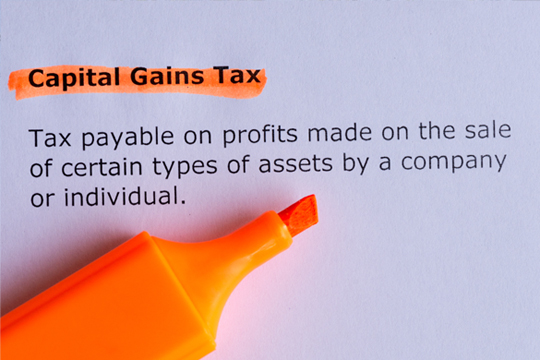If you are selling a property, you may be liable to pay capital gains tax. But whether you need to pay, or how much is due, depends on a number of different factors. Here we explain more about capital gains tax, what it is and how it affects property owners.
What is capital gains tax?
Capital gains tax is a tax applied to any profit made on the sale of an asset that has increased in value. You may be liable to pay the tax on any personal possessions worth £6,000 or more (except your car), property, business assets and any shares that are not in an ISA or PEP.
Do I have to pay capital gains tax on my home?
If you are selling your home, you may have to pay capital gains tax (CGT) on any profit made from the transaction.
However, this generally doesn’t apply when you are selling your main home, as you are entitled to ‘private residence relief’. CGT isn’t applied to the time the property was your main residence and the last 9 months of ownership (even if you weren’t living there during this time).
But if you are selling a buy-to-let property or second home, you will usually have to pay CGT. The tax may also be payable if your home is partly used as a business, or if part of the property is leased out.
Is there any CGT tax relief available if you are letting out the property?
Any gains made could be taxable if you let out all or part of the property. However, letting relief may be available if you used to live in the property (or if you live there when it was sold). Bear in mind that this does not apply to buy-to-let investors as the property is lived in by tenants, rather than themselves.
You may need to seek independent financial advice on how whether you can claim letting relief, as much depends on the sale price and your history with the property.
What are the current capital gains tax rates?
In the UK, basic-rate taxpayers pay 18% on any profit they made above the allowance threshold. Higher and additional-rate taxpayers must pay a higher rate of 28%.
When your income tax bracket is being calculated, capital gains are added to your other sources of income, which can mean you are pushed into a higher bracket./p>
What is the capital gains tax allowance?
Capital gains tax is payable on any gains that exceed your yearly allowance. For the period 2021-22, the tax-free allowance is £12,300 per person, which is the same as the previous year. This will remain at the same rate in 2022-23.
The allowance means the value of your property can increase by this amount before you have to pay any CGT when it is sold.
Assets jointly owned by couples can combine this allowance, which could mean you could gain up to £24,600 without having to pay any tax. You must use your CGT allowance every year as it cannot be carried over into the next financial year, so if it is not used it will be lost for the period.
How do you calculate capital gains tax?
You calculate capital gains tax on property by deducting the amount you originally paid for your home from the sales price. Any legitimate costs associated with the buying and selling of the property can be deducted, such as stamp duty, broker fees and some home improvements made while you were the owner, such as house extensions.
Any losses made when selling other assets can also be offset. For example, if you own a portfolio of properties and make a loss of £30,000 when selling one of them, you can use that loss against the gains of another property, which will help reduce your capital gains tax bill.
When do you have to pay your capital gains tax bill?
If you have sold a property after October 27, 2021, the tax needs to be paid within 60 days of completion.
The CGT payment deadline was previously 30 days, but this was extended to 60 days in the October 2021 budget, giving people more time to manage their financial affairs.
Thinking of selling your home?
If you are thinking of selling your home and need to know to how much it is worth, get in contact with us today and we can arrange a virtual property sales valuation . It’s quick and easy and will give you a much clearer idea of the sale price you should set.




